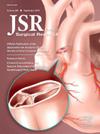The Predictive Value of Basic Laparoscopic Evaluations on Complex Cases Using the Society for Improving Medical Procedural Learning Database
IF 1.7
3区 医学
Q2 SURGERY
引用次数: 0
Abstract
Introduction
The transference of technical skills from basic to complex procedures is assumed–but untested–during training and board certification. We examine whether resident performance on frequently performed, basic laparoscopic procedures can predict performance on their first complex laparoscopic procedure.
Methods
This cross-sectional, retrospective study employs the Society for Improving Medical Procedural Learning collaborative operating room database from 2016 to 2023 using attending-level evaluations of general surgery residents at accredited teaching hospitals. Using cumulative instances of prior basic laparoscopic procedures, we applied five machine learning algorithms to predict the performance on the resident's first complex procedure. Procedures were labeled “basic” or “complex” according to Accreditation Council on Graduate Medical Education definitions.
Results
7792 attending evaluations of 899 unique residents were included. The number of residents with evaluations of prior basic procedures varied and dropped linearly from 646 (2 prior) to 180 (10 prior). The best performing random forest model obtained a mean squared error of 0.23 (95% confidence interval 0.17-0.29) using 3 prior procedures. Resident postgraduate year was the most important predictor, and simple univariate regression on this variable yielded a mean squared error of 0.33 (95% confidence interval 0.31-0.37).
Conclusions
Basic laparoscopic performance ratings were moderately effective in predicting subsequent performance on complex procedures but offered little additional predictive value over postgraduate year alone.
基于改进医学程序学习学会数据库的腹腔镜基础评估对复杂病例的预测价值
在培训和委员会认证期间,假定技术技能从基本程序转移到复杂程序,但未经检验。我们研究了住院医生在经常进行的基本腹腔镜手术中的表现是否可以预测他们在第一次复杂腹腔镜手术中的表现。方法采用美国改进医疗程序学习学会(Society for improvement Medical procedure Learning)的协作手术室数据库,对2016年至2023年认可的教学医院普外科住院医师的主治水平进行评估,采用横断面、回顾性研究。利用之前基本腹腔镜手术的累积实例,我们应用了五种机器学习算法来预测住院医生第一次复杂手术的表现。根据研究生医学教育认证委员会的定义,程序被标记为“基本”或“复杂”。结果共纳入899名住院医师的7792人次参加评估。接受先前基本程序评估的住院医师数量变化,从646人(2人)线性下降到180人(10人)。最佳随机森林模型使用3个先验程序,均方误差为0.23(95%置信区间为0.17-0.29)。研究生居住年份是最重要的预测因子,对该变量进行简单的单因素回归,均方误差为0.33(95%置信区间为0.31-0.37)。结论基本的腹腔镜性能评分在预测复杂手术的后续性能方面是中等有效的,但仅在研究生阶段提供的额外预测价值很小。
本文章由计算机程序翻译,如有差异,请以英文原文为准。
求助全文
约1分钟内获得全文
求助全文
来源期刊
CiteScore
3.90
自引率
4.50%
发文量
627
审稿时长
138 days
期刊介绍:
The Journal of Surgical Research: Clinical and Laboratory Investigation publishes original articles concerned with clinical and laboratory investigations relevant to surgical practice and teaching. The journal emphasizes reports of clinical investigations or fundamental research bearing directly on surgical management that will be of general interest to a broad range of surgeons and surgical researchers. The articles presented need not have been the products of surgeons or of surgical laboratories.
The Journal of Surgical Research also features review articles and special articles relating to educational, research, or social issues of interest to the academic surgical community.

 求助内容:
求助内容: 应助结果提醒方式:
应助结果提醒方式:


